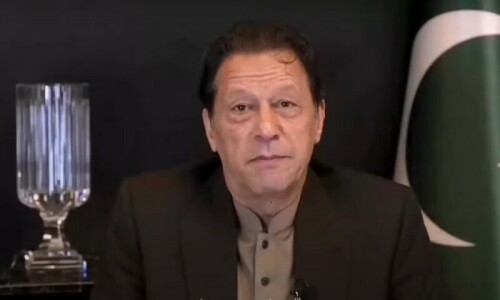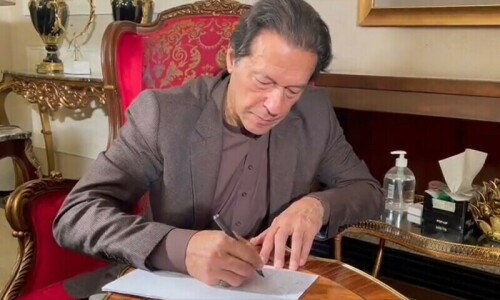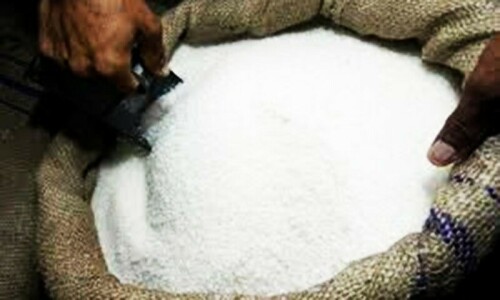Caretaker Information Minister Murtaza Solangi on Friday said the government will be writing to the editor of British publication The Economist in connection with an essay attributed to incarcerated PTI founder Imran Khan.
Imran was convicted in the Toshakhana case on August 5, and sentenced to three years’ imprisonment. On August 28, the Islamabad High Court had suspended his sentence. However, he has remained in jail since in other cases registered against him.
A guest essay attributed to Imran in The Economist on Thursday indicated that he had serious doubts about whether the upcoming elections would be held or not.
The piece repeated his allegations about how a regime change brought about after US government pressure led to a vote of no-confidence against him and described the May 9 riots as a “false-flag operation” which was “pre-planned”.
But an editor’s note at the end of the essay noted that the Pakistan government and US State Department denied the allegations of American interference, saying that the government was prosecuting him under the Official Secrets Act.
While sources within the party were hesitant to comment on how the writing may have been relayed to the publication from inside prison, they had insisted that the words were indeed those of Imran. Some observers had expressed doubts over whether the article was indeed by Imran but many noted that the tone and content of the article was consistent with his views.
Responding to the development today, Solangi said: “We are writing to the editor of The Economist about an article purportedly written by Imran Khan.
“It is puzzling and disconcerting that such an esteemed media outlet published an article in the name of an individual who is in jail and has been convicted,” Solangi, a former journalist, said.
“We believe it is critically essential to uphold ethical standards and promote responsible journalism,” he added. “We would like to know how the editorial decision was made, and what considerations were taken into account regarding the legitimacy and credibility of the content by The Economist,” he said.
“We would also be interested to know if The Economist has ever published such ghost articles by jailed politicians ever from any other part of the world. If jailed convicts were free to write to the media, they would always use the opportunity to air their one-sided grievances,” the information minister said.
‘Disaster and farce’
While expressing fears that the election scheduled for February 8 may not take place at all, the article in question Imran stated that even if they do, such polls would be a “disaster and a farce since PTI is being denied its basic right to campaign”.
“Whether elections happen or not, the manner in which I and my party have been targeted… has made one thing clear: the establishment — the army, security agencies and the civil bureaucracy — is not prepared to provide any playing field at all, let alone a level one, for PTI,” he said.
Imran also criticised the Pakistan Democratic Government’s performance, saying it “destroyed the economy, bringing about unprecedented inflation and a currency devaluation within 18 months”.
“Unfortunately, the establishment had decided I could not be allowed to return to power, so all means of removing me from the political landscape were used,” he said, recalling “two assassination attempts” and the abduction, incarceration or torture of party leaders, workers and social media activists.
“Some were compelled to join other, newly created political parties. Others were made to give false testimony against me under duress,” he said, yet claiming that despite all this, his party remained popular.
Imran also hit out at the courts, who in his words “seem to be losing credibility daily”, referring to the easy exoneration of PML-N’s Nawaz Sharif.
He alleged that it is his belief that Nawaz “has struck a deal with the establishment whereby it will support his acquittal and throw its weight behind him in the upcoming elections”.
It is worth noting that after his removal from office, Imran went on an international media blitz and appeared on several major global media outlets, but this stopped after his incarceration, as access to the PTI chairman became limited to his lawyers and family members.
But in recent months, the party has found unconventional ways to deliver his message: at a recent virtual rally, an AI-generated address was delivered in Imran’s voice.
His words have also made it out of prison in other ways, over recent months. He recently wrote to Chief Justice of Pakistan Qazi Faez Esa, requesting the top judge to protect the party’s fundamental rights.

















































